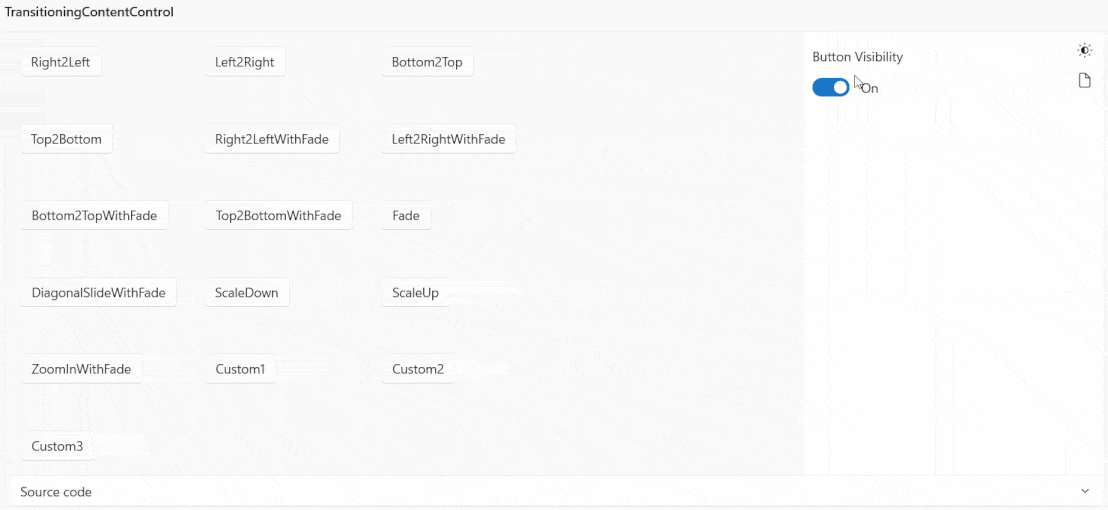Mainly used for the transitional rendering effect of changing content.
1
| public partial class TransitioningContentControl : ContentControl
|
Attributes
| Property |
Description |
Default Value |
Remarks |
| TransitionMode |
Transition Mode |
TransitionMode.Right2Left |
|
| TransitionStoryboard |
Transition Animation |
|
|
Case
1
2
3
4
5
6
7
8
9
10
11
12
13
14
15
16
17
18
19
20
21
22
23
| <Storyboard x:Key="Custom1Transition" x:Shared="False">
<DoubleAnimation From="50" To="0" Duration="0:0:0.4" Storyboard.TargetProperty="(UIElement.RenderTransform).(TransformGroup.Children)[3].(TranslateTransform.X)">
<DoubleAnimation.EasingFunction>
<ElasticEase Oscillations="1"/>
</DoubleAnimation.EasingFunction>
</DoubleAnimation>
</Storyboard>
<Storyboard x:Key="Custom2Transition" x:Shared="False">
<DoubleAnimation From="10" To="0" Duration="0:0:0.4" Storyboard.TargetProperty="(UIElement.RenderTransform).(TransformGroup.Children)[2].(RotateTransform.Angle)">
<DoubleAnimation.EasingFunction>
<ElasticEase Oscillations="1"/>
</DoubleAnimation.EasingFunction>
</DoubleAnimation>
</Storyboard>
<Storyboard x:Key="Custom3Transition" x:Shared="False">
<DoubleAnimation From=".8" To="1" Duration="0:0:0.4" Storyboard.TargetProperty="(UIElement.RenderTransform).(TransformGroup.Children)[0].(ScaleTransform.ScaleX)">
<DoubleAnimation.EasingFunction>
<ElasticEase Oscillations="1"/>
</DoubleAnimation.EasingFunction>
</DoubleAnimation>
</Storyboard>
|
1
2
3
4
5
6
7
| <dev:TransitioningContentControl TransitionMode="Right2Left">
<Button Content="Right2Left" />
</dev:TransitioningContentControl>
<dev:TransitioningContentControl TransitionStoryboard="{StaticResource Custom1Transition}">
<Button Content="Custom1" />
</dev:TransitioningContentControl>
|
Demo
you can run demo and see this feature.

